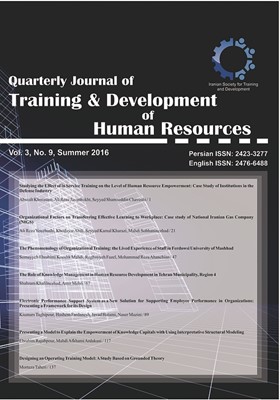Exploring the Positive and Negative Roles of Mentoring on Improving Knowledge Sharing: Barriers and Solutions
Subject Areas :
Aryan gholipour
1
![]() ,
seyed Javad Mousavi
2
*
,
Mohammad hashemi
3
,
seyed Javad Mousavi
2
*
,
Mohammad hashemi
3
1 - مدیریت
2 - University of Tehran
3 - University of Tehran
Keywords: Mentoring Knowledge Sharing Staff Turnover,
Abstract :
The purpose of this research is to explore the positive and negative roles of mentoring on improving knowledge sharing. High turnover rate of talented and experienced employees in this industry are seen due to the fierce competition between active companies in the capital market industry. Thus, we suggest mentoring to keep and share knowledge in company before they intend to quit. The statistical society of the research is experienced employees and human resource specialists in Amin Tamin Sarmayeh, Lotos Parsian, and Melat bank who were aware of the subject. In addition, the sample was selected using snowball sampling. Qualitative research method is used and we used interview to data collecting. Theme analysis is used to data anlyzing. Generally, the purpose of this research is to answer to three questions: 1. what are the barriers of sharing knowledge? 2. What are the volunteer ways to perform mentoring in company? And 3. What strategies would you recommend to prevent the mentee to quit the organization? According to the results, from the perspective of Participators, knowledge sharing barriers were divided to three parts: individual, organizational, and cultural barriers. To perform mentoring, volunteer strategies in organization include three following parts: training, compensation, and appointed curator of the implementation of mentoring. To prevent the mentee to quit the organization, the strategies are divided in four parts as follows: hiring, job advantages after mentoring, branding, mentoring executive procedures.
Allen,T. D., Finkelstein, L. M., & Poteet, M. L. (2009). Designing Workplace Mentoring Programs: An Evidence-Based Approach. Wiley-Blackwell, Singapore.
Bryant, S. E. (2005). The impact of Peer Mentoring on Organizational knowledge creation and sharing an empirical study in a software firm. Group & Organization Management,30(3), 319-338.
Donnelly, R. (2008). The management of consultancy knowledge: an internationally comparative analysis. Journal of Knowledge Management, 12(3), 71-83.
Eby, L. T. (1997). Alternative forms of mentoring in changing organizational environments: A conceptual extension of the mentoring literature. Journal of vocational behavior, 51(1), 125-144.
Egan, T. M., & Song, ZH. (2008). Are facilitated mentoring programs beneficial? A randomized experimental field study. Vocational Behavior, 72, 351–362
Field, J. (2001). Mentoring: a natural act for information professionals? New Library World, 102, 269-273.
Fleig-Palmer, M. M. (2009). The impact of mentoring on retention through knowledge transfer, affective commitment, and trust. Dissertations from the College of Business Administration.
Fleig-Palmer, M. M., & Schoorman, F. D. (2011). Trust as a moderator of the relationship between mentoring and knowledge transfer. Journal of Leadership & Organizational Studies,18(3), 334-343.
Gholipor, R., & Hashemi, M. (2015). The Effect of Mentoring on Succession Planning: Focusing on Individual Development Plan. Research in human resource management,7(2), 25-52.
Gibson, J. L., Ivancevich, J. M., Donnelly, J. H., & Konopaske, R. (2006). Organizations: behavior, structure, processes. New York: McGraw-Hill.
Gillian, B. (2011). Learning to lead in the 'year of the firsts': a study of employer led mentoring for new school leaders in Scotland. (Doctoral dissertation). University of Glasgow.
Hallam, P. R., Chou, P. N., Hite, J. M., & Hite, S. J. (2012). Beginning Teachers Two Contrasting Models for Mentoring as They Affect Retention of Beginning Teachers. NASSP Bulletin,96(3), 243–278.
Hart, E. W. (2009). Seven keys to successful mentoring. Center for Creative Leadership.
Hezlett, S. A. (2005). Protégés' Learning in Mentoring Relationships: A Review of the Literature and an Exploratory Case Study. Advances in Developing Human Resources,7, 505.
Hezlett,S., & K. Gibson, SH. (2005). Mentoring and Human Resource Development: Where We Are and Where We Need to Go. Advances in Developing Human Resources,7(4), 446-469
Karkoulian, S., Halawi, L. A., & Mc Carthy, R. V. (2008). Knowledge management formal and informal mentoring: An empirical investigation in Lebanese banks. The Learning Organization,15(5), 409-420.
Klasen, N., & Clutterbuck, D. (2012). Implementing Mentoring Schemes, a Practical Guide to Successful Programs. Routledge.
Lapointe, É., & Vandenberghe, C. (2017). Supervisory mentoring and employee affective commitment and turnover: The critical role of contextual factors. Journal of Vocational Behavior,98, 98-107.
Lawal, O. A. (2011). An Evaluation of Mentoring In Organizations: Nigerian Peculiarities. IFE PsychologIA : An International Journal, 2011(1), 379-397.
Loebbecke, C., van Fenema, P. C., & Powell, P. (2016). Managing inter-organizational knowledge sharing. The Journal of Strategic Information Systems,25(1), 4-14.
Mathis, R.L., & Jackson, J. H. (2000). Human Resource Management (9th Ed.). South-Western College Publishing.,
Noe, R. A., Hollenbeck, J. R., Gerhart, B., & Wright, P. M. (2007). Fundamentals of Human Resource Management. Fourth Edition. McGraw-Hill/Irwin.
Nonaka, I., & Konno, N. (1998). The concept of" ba": Building a foundation for knowledge creation. California management review,40(3), 40-54.
Pask, R., & Joy, B. (2007). Mentoring-coaching: a guide for education professionals. McGraw-Hill Education (UK).
Ragins, B.R. and Cotton, J.L. (1999). Mentor functions and outcomes: a comparison of men and women in formal and informal mentoring relationships. Journal of Applied Psychology,84, 529-50.
Richard, O. C., Ismail, K. M., Bhuian, Sh. N., & Taylor, E. C. (2009). Mentoring in supervisor–subordinate dyads: Antecedents, consequences, and test of a mediation model of mentorship. Business Research,62, 1110–1118.
Steinar, K. (1996). Interviews: An introduction to qualitative research interviewing. Student litterateur, Lund, 8.
Swap, W., Leonard, D., & Mimi Shields, L. A. (2001). Using mentoring and storytelling to transfer knowledge in the workplace. Journal of management information systems,18(1), 95-114.
Xianting, Y. & Fungfai, N. (2009). Learning Organization and Mentoring Practice: An Empirical Investigation. 17th Annual European Real Estate Society Conference in Milan, Italy.
Zhang, X., & Jiang, J. Y. (2015). With whom shall I share my knowledge? A recipient perspective of knowledge sharing. Journal of Knowledge Management,19(2), 277-295.

